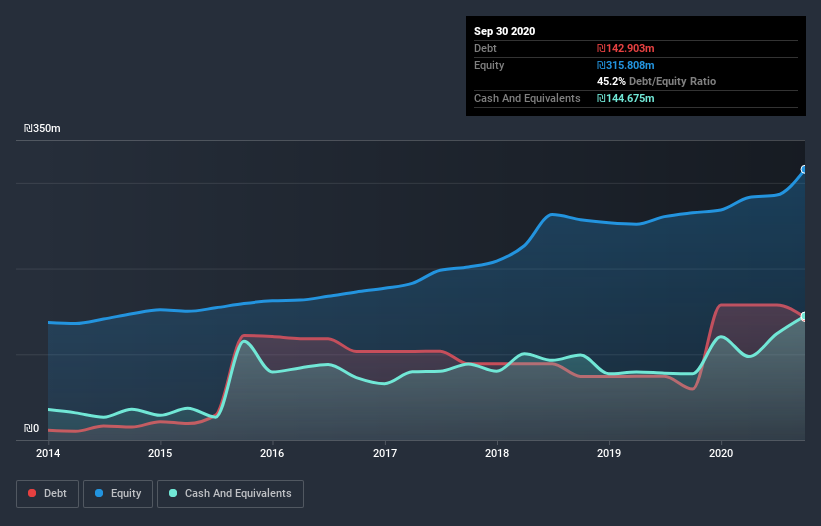- Israel
- /
- Food and Staples Retail
- /
- TASE:VCTR
Victory Supermarket Chain (TLV:VCTR) Has A Pretty Healthy Balance Sheet

Howard Marks put it nicely when he said that, rather than worrying about share price volatility, 'The possibility of permanent loss is the risk I worry about... and every practical investor I know worries about.' When we think about how risky a company is, we always like to look at its use of debt, since debt overload can lead to ruin. Importantly, Victory Supermarket Chain Ltd (TLV:VCTR) does carry debt. But should shareholders be worried about its use of debt?
What Risk Does Debt Bring?
Generally speaking, debt only becomes a real problem when a company can't easily pay it off, either by raising capital or with its own cash flow. Part and parcel of capitalism is the process of 'creative destruction' where failed businesses are mercilessly liquidated by their bankers. However, a more common (but still painful) scenario is that it has to raise new equity capital at a low price, thus permanently diluting shareholders. Of course, the upside of debt is that it often represents cheap capital, especially when it replaces dilution in a company with the ability to reinvest at high rates of return. When we examine debt levels, we first consider both cash and debt levels, together.
See our latest analysis for Victory Supermarket Chain
How Much Debt Does Victory Supermarket Chain Carry?
You can click the graphic below for the historical numbers, but it shows that as of September 2020 Victory Supermarket Chain had ₪142.9m of debt, an increase on ₪59.4m, over one year. But on the other hand it also has ₪144.7m in cash, leading to a ₪1.77m net cash position.

How Healthy Is Victory Supermarket Chain's Balance Sheet?
According to the last reported balance sheet, Victory Supermarket Chain had liabilities of ₪555.0m due within 12 months, and liabilities of ₪1.06b due beyond 12 months. On the other hand, it had cash of ₪144.7m and ₪214.1m worth of receivables due within a year. So its liabilities total ₪1.26b more than the combination of its cash and short-term receivables.
Given this deficit is actually higher than the company's market capitalization of ₪1.04b, we think shareholders really should watch Victory Supermarket Chain's debt levels, like a parent watching their child ride a bike for the first time. Hypothetically, extremely heavy dilution would be required if the company were forced to pay down its liabilities by raising capital at the current share price. Given that Victory Supermarket Chain has more cash than debt, we're pretty confident it can handle its debt, despite the fact that it has a lot of liabilities in total.
Importantly, Victory Supermarket Chain grew its EBIT by 77% over the last twelve months, and that growth will make it easier to handle its debt. The balance sheet is clearly the area to focus on when you are analysing debt. But you can't view debt in total isolation; since Victory Supermarket Chain will need earnings to service that debt. So if you're keen to discover more about its earnings, it might be worth checking out this graph of its long term earnings trend.
Finally, while the tax-man may adore accounting profits, lenders only accept cold hard cash. Victory Supermarket Chain may have net cash on the balance sheet, but it is still interesting to look at how well the business converts its earnings before interest and tax (EBIT) to free cash flow, because that will influence both its need for, and its capacity to manage debt. Over the last three years, Victory Supermarket Chain actually produced more free cash flow than EBIT. That sort of strong cash conversion gets us as excited as the crowd when the beat drops at a Daft Punk concert.
Summing up
Although Victory Supermarket Chain's balance sheet isn't particularly strong, due to the total liabilities, it is clearly positive to see that it has net cash of ₪1.77m. And it impressed us with free cash flow of ₪169m, being 117% of its EBIT. So we are not troubled with Victory Supermarket Chain's debt use. The balance sheet is clearly the area to focus on when you are analysing debt. But ultimately, every company can contain risks that exist outside of the balance sheet. To that end, you should be aware of the 2 warning signs we've spotted with Victory Supermarket Chain .
When all is said and done, sometimes its easier to focus on companies that don't even need debt. Readers can access a list of growth stocks with zero net debt 100% free, right now.
If you decide to trade Victory Supermarket Chain, use the lowest-cost* platform that is rated #1 Overall by Barron’s, Interactive Brokers. Trade stocks, options, futures, forex, bonds and funds on 135 markets, all from a single integrated account. Promoted
New: Manage All Your Stock Portfolios in One Place
We've created the ultimate portfolio companion for stock investors, and it's free.
• Connect an unlimited number of Portfolios and see your total in one currency
• Be alerted to new Warning Signs or Risks via email or mobile
• Track the Fair Value of your stocks
This article by Simply Wall St is general in nature. It does not constitute a recommendation to buy or sell any stock, and does not take account of your objectives, or your financial situation. We aim to bring you long-term focused analysis driven by fundamental data. Note that our analysis may not factor in the latest price-sensitive company announcements or qualitative material. Simply Wall St has no position in any stocks mentioned.
*Interactive Brokers Rated Lowest Cost Broker by StockBrokers.com Annual Online Review 2020
Have feedback on this article? Concerned about the content? Get in touch with us directly. Alternatively, email editorial-team@simplywallst.com.
About TASE:VCTR
Good value with proven track record.


